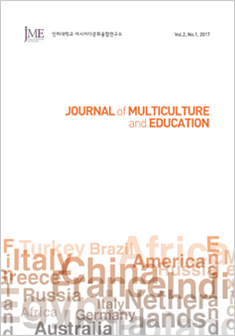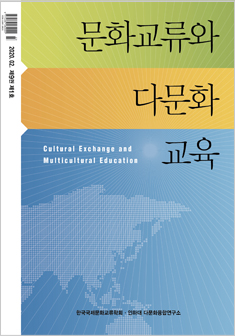
논문검색
HOME 학회지 논문검색
문화교류와 다문화교육, (2024)
pp.539~565
Kop 연결주의 학습이론 기반 문화예술교육 프로그램 적용
본 연구는 연결이 강조되는 온택트 시대에 적합한 연결주의 학습이론 기반 문화예술 교육 프로그램 개발 적용에 관한 연구이다. 이에 본 연구는 연결주의 학습이론 기반 문 화예술교육 프로그램 적용에 참여한 교사의 경험을 분석하여 미래 문화예술교육의 방 향을 제시하는 것을 목적으로 한다. 이를 위해 초등학교 학생을 위해 디지털 디바이스 활용 연결주의 학습이론 기반 문화예술교육 프로그램을 개발하여, 국내의 한 초등학교 학생을 대상으로 4시수씩 3학급에 적용하였다. 그리고 본 문화예술교육 프로그램에 참 여한 6명의 교사(예술강사 3명, 초등교사 3명)를 연구참여자로 선정하여, 수업 적용 전 부터 이후까지 약 4개월 동안 수업 관찰 및 면담을 진행하였다. 구체적으로 이 연구는 교사가 디지털 디바이스 활용 연결주의 학습이론 기반 문화예술교육 프로그램을 접하 게 된 계기, 교육 실행 경험, 본 예술교육 프로그램 실행을 저해하는 현실적이고 구조적 인 제약들, 그리고 연결주의 학습이론 기반 문화예술교육 프로그램이 갖는 교육적 의 미 등을 살펴보았다. 이 교사들의 내러티브에 근거하여 볼 때, 연결주의 학습이론 기반 문화예술교육 프 로그램은 첫째, 새로운 온택트 연결주의 시대라는 환경에서 연결주의 학습이론 기반 문화예술교육 프로그램의 유의미성과 학교 현장에서의 상행 가능성을 보여주었고, 둘 째, 새로운 디지털 문명을 접하고 활용하는 세대의 학생들에게 연결주의 학습이론 기 반 문화예술교육 프로그램이 가진 가치를 발견할 수 있었다. 셋째, 문화예술교육을 담당하는 교사들이 빠르고 새롭게 변하는 교육환경에 적응하기 위해 필요한 유용한 교육 방법이자 내용이 바로 연결주의 학습이론 기반 문화예술교육임을 보여준다. 하지만, 학교 교육 현장의 변화에 대한 부정적인 문화와 학교별 지원예산과 배움에 대한 문화 적 차이, 개인 역량 등 디지털 디바이스를 활용한 연결주의 학습이론 기반 문화예술교 육을 실제 학교 현장에 적용하는데 있어서의 다양한 제한점들이 있었다. 이상의 연구 결과를 바탕으로, 이 연구는 연결주의 학습이론 기반 문화예술교육의 필요성과 미래 방향을 제시하였다.
A Study on Cultural Arts Education Prograsm : Based on Kop Connectivism Learning Theory
This study intends to present a new direction for arts and culture education by interpreting the experiences of arts and culture education based on connectivism learning theory of art instructors and teachers practicing arts and culture education in school from the perspective of connectivism and future arts and culture education. To this end, the research question was set as the meaning of arts and culture education experiences based on connectivism learning theory of art instructors and teachers in charge who are practicing arts and cultural education. In this study, after defining the basic concept of arts and culture education to solve the research problem, we discussed theoretically about arts and culture education in schools, connectivism, the era of open learning, and the digital native generation. And as a future arts and culture education, the meaning and value of arts and culture education based on connectivism learning theory was analyzed. Next, a narrative inquiry method was used as a research method to interpret the future arts and culture education experiences of art instructors and elementary school teachers, the participants in this study, from the perspective of connectivism. The results of analyzing the participants' arts and culture education experience from the perspective of connectivism and future arts and culture education are as follows. First, art instructors have formed their pride and identity as art instructors, arts and culture education experts, and artists even before working at Arte School. This process of identity formation put them in the position of experts as arts and culture education experts and artists, and became the starting point of arts and culture education based on connectivism learning theory at Arte School. Second, at Arte School, art instructors had a new experience of encountering the expansion of online education system and connectivism learning theory, and this experience led to the development and practice of a new arts and culture education program. Third, art instructors experience meeting with teachers at Arte School, learning and practicing connectivism, developing and practicing arts and culture education programs based on new connectivism learning theory, and experiencing connectivism learning theory-based culture as the direction of future arts and cultural education. I came to understand the value and meaning of art education. Since then, the development and practice of a new arts and culture education program at Arte School has been linked to the development and practice of a arts and culture education program based on connectivism learning theory elsewhere. Fourth, the new narrative of teachers who practiced the arts and culture education program developed by art instructors reaffirmed the value and meaning of arts and cultural education based on connectivism learning theory, which became a driving force for continuous research and development and practice. The significance of this study is that the experience of development and practice of arts and culture education based on connectivism learning theory can suggest a direction as an alternative to new arts and culture education in the rapidly changing modern society and future society. In order to expand the value and meaning of arts and culture education based on connectivism learning theory in the future, more research and professional arts instructors and teachers should be developed.
 다문화와 교육(Journal of Multiculture and Education)
다문화와 교육(Journal of Multiculture and Education) 문화교류와 다문화교육
문화교류와 다문화교육